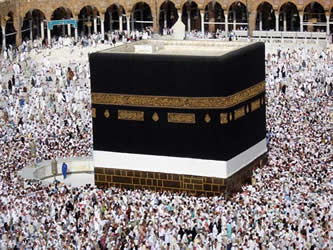I'm about halfway through
Islam and the Myth of Confrontation: Religion and Politics in the Middle East by Professor Fred Halliday. Halliday is originally from Dublin, and lectures about the Middle East in the London School of Economics. I usually read his column on
Open Democracy, which gives a great analysis of events in the region.

Mecca
Political Islam is the use of Islam in the realm of politics. Actors who subscribe to this philosophy are known as Islamists. As well believing that Islam should be the basis of a political system, Islamists use the Muslim faith as a tool of popular mobilisation, and as the means to express political and social ideas in a religious language.
One of the academic questions that often comes up when studying political Islam is that of civilisational values. There are those who believe that we are currently in a situation where there is a 'Clash of Civilisations' between Islam and the West. Halliday is among those who suggest that the rise of political Islam in the Middle East and North Africa is linked to Western policies in the region, rather than some kind of essential Islamic values. He identifies political Islam as being essentially problem-driven in nature. According to this understanding, Islamist actors are responding to perceived social and political problems in the region, rather than some kind of hatred for the West.
Because Islamists are attempting to provide solutions to problems, Halliday believes that "the issue of development... is a useful starting point" (p. 128) in understanding political Islam. Halliday agrees that the region is faced with significant social problems. However, he doesn't have much faith in the potential for the Islamists to come up with effective solutions, making reference to "empty ideas about 'Islamic economics'". I do not fully agree with his dismissal of the credibility of political Islam. It seems to me to be too soon to tell whether the Islamists would provide any real answers if they were able to gain power.

Ayatollah Khomeini
One of the strengths of Halliday's analysis is his emphasis on the variety of political Islam. He demonstrates that it is the specific context of the political situation in different countries that explains the actions of Islamist actors. Therefore, for example, the Palestinian Islamist movement, Hamas, can only be understood in the context of the Israeli occupation and the realities of life in Palestine. And the course taken by the Iranian revolution was influenced by the conditions during the Pahlavi dynasty. Thus political Islam should be understood as the result of a particular social and political context, and cannot be explained by reference only to qualities inherent within the Islamic religion.
One of Halliday's main points in the book is that the Middle East does NOT need to be studied using some unique category of explanation. It should be possible to study the region using the same analytical tools you would use to study any other area of the world. Halliday rejects the view that the only categories that can be used to describe Muslim societies are categories that are specific to the region; for example, that categories such as Marxism or Weberian sociology should be rejected in favour of authentic, local, often Islamic concepts.
Halliday can speak some Persian and Arabic and has a direct knowledge of the region. His particular area of expertise is Iran, and he devotes an entire chapter of the book to the Iranian revolution. I'd highly recommend this section to anyone with an interest in Iran. He has also
met with Hizbollah's senior political strategist Sheikh Naim Qassem in Beirut.
Labels: Asia, development, education, Hamas, Iran, Islamists, Middle East, North Africa
.jpg)
.jpg)
.jpg)

.jpg)
.jpg)
.jpg)

